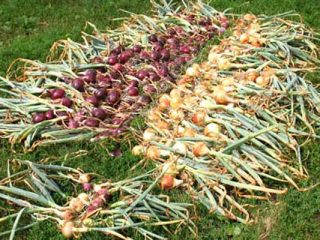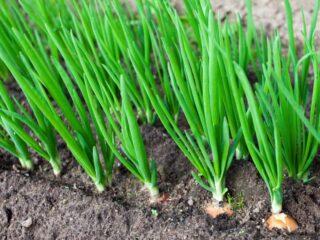Content
Strigunovsky onions have been grown in Russia for several centuries. And he still withstands "competition" from the new selection. The variety has many advantages, gardeners appreciate it for its unpretentious care, suitability for planting in the vast majority of Russian regions, and high yield. It was not possible to identify significant shortcomings during the entire cultivation period.
Origin of the variety
Strigunovsky onion (now known as Strigunovsky local or Strigunok) is an old Russian variety cultivated since the middle of the 18th century. It was bred in the village of Striguny (now it is the Belgorod region), hence the name.
The variety of "folk selection" turned out to be very successful. It was also appreciated by foreign experts (Gold Medal of the World Exhibition in Paris, Big Gold Medal of the Spring Fair in Leipzig). Since 1943, he was listed in the Soviet State Register of Breeding Achievements under the name "Strigunovsky Local". The variety was actively grown on an industrial scale in the Volga region, the Black Sea region, Belarus, Uzbekistan, and Kazakhstan.
They did not exclude him from the Russian State Register either. Strigunovsky onion is officially recommended for cultivation in all regions of Russia, where, in principle, gardening is possible.

Since the applicant is not listed in the State Register, there are now several agricultural firms that produce Strigunovsky onion seeds
Description and characteristics of the Strigunovsky onion
Outwardly, Strigunovsky is a classic onion. A layman is unlikely to be able to "identify" it among similar varieties of bulbs.
Appearance
The Strigunovsky onion is a fairly compact plant with medium-sized, semi-erect leaves. Sometimes, closer to the apex, the “feathers” are slightly bent.
The bulbs are of different sizes, the weight varies within 45-80 g. The shape is rounded, slightly sharpening at the bottom and top. The outer integumentary scales are light - yellowish-beige with a pinkish-gray undertone.

On the cut, Strigunovsky bulbs are snow-white
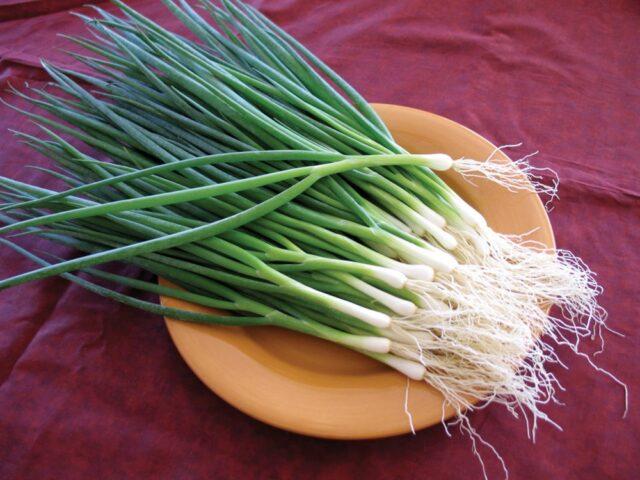
The color of the "feathers" of Strigunovsky is typical for green onions, there is a light gray-gray "waxy" bloom
Ripening time and yield
Strigunovsky onion belongs to the varieties of early ripening. Harvesting is started 77-98 days after the seedlings sprout. The percentage of ripened bulbs at this point is 49-97%. Such a large "spread" is explained by the climatic characteristics of different regions. The weather during the growing season also matters.
An amateur gardener, practically without caring for plantings, can count on 1.18-3.27 kg / m². Competent agricultural technology combined with warm and sunny summers increases the yield to 4.8-6 kg / m².

Strigunovsky onion has a very good keeping quality - without losing its consumer properties, it can be stored for 9-12 months
Disease and pest resistance
Strigunovsky onion has an "innate" immunity to many diseases typical of the culture. The gardener does not have to worry about protecting plantings from fusarium, rust, mosaic virus.
For most pests, spicy onions are "inedible" in principle. For those who nevertheless show interest in him, Strigunovsky is not too "in demand" either. Aphids, spider mites, root nematodes, and onion flies in most cases bypass it.
Composition and properties
Onion Strigunovsky contains:
- phytoncides, "natural" antibiotics that destroy pathogenic microflora;
- chlorophyll, useful for strengthening and maintaining the elasticity of the walls of large blood vessels and capillaries;
- essential oils;
- organic acids;
- vitamins A, C, E, almost the entire group B.
This composition provides benefits for the body:
- Beneficial effect on immunity, prevention of seasonal colds, spring vitamin deficiency.
- Improving blood quality, normalizing sugar content, cholesterol levels.
- Prevention of hypertension, atherosclerosis, varicose veins, blood clots, limb cramps.
- Help in cleansing the body of toxins and toxins, even in removing salts of heavy metals.
- Improving the condition of hair and nails, both when included in the menu and when used "externally", for example, decoctions for rinsing hair, gruel as a mask for the scalp.
Where is used
Strigunovsky onion is a food, not an ornamental plant. The appointment is universal. It can be consumed not only fresh. In cooking, this variety is widely used boiled, fried, stewed. It is added to salads, filling for savory pies, homemade products. This applies to both the bulbs themselves and the feather.
After heat treatment, the Strigunovsky onion loses its sharpness a little. Light sweetish notes appear on the palate.
Advantages and disadvantages
The popularity of the Strigunovsky onion variety is due to a number of its undoubted advantages:
- early maturity;
- consistently good yields, even if spring and summer are not very successful in terms of weather;
- transportability, keeping quality while maintaining consumer properties;
- a good percentage of ripened bulbs at the time of harvest;
- general unpretentiousness in care;
- suitability for landing in Russia almost everywhere;
- resistance to heat, drought, cold weather, temperature extremes;
- good immunity, resistance against pests;
- versatility of the purpose of the bulbs;
- the possibility of reproduction by seeds and seedlings.
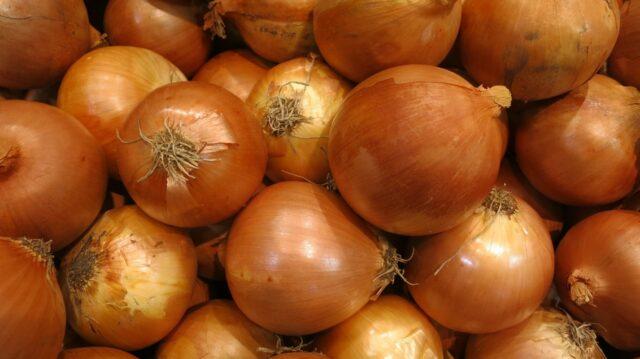
Strigunovsky onion is a very successful combination of ease of cultivation with "stress resistance" and taste.
The disadvantages of the Strigunovsky variety are exclusively subjective. Not all growers like the relatively small size of the bulbs and the pronounced pungent taste.
Planting methods for onions Strigunovsky
Strigunovsky onions can be planted with both seeds and sevka. The experience of gardeners shows that in the second case, the bulbs ripen longer, but they turn out to be larger.
Growing from seeds
Before planting Strigunovsky onion seeds, they must be checked for germination. Soak them in a sodium chloride solution (about 50 g / l). "Empty" seeds, which do not contain an embryo, immediately float to the surface.
Further, it is recommended to apply means to improve germination. The easiest option is any commercially available biostimulant (Epin, Zircon, Heteroauxin). You can also carry out "hardening" by first soaking Strigunovsky onion seeds in hot (45-50 ° C) water for half an hour, and then in cold water for 12-15 minutes.
Then the seeds of the Strigunovsky onion are dried to a loose state and planted on seedlings:
- Plant them in relatively shallow wide containers filled with well-moistened universal seedling soil. The seeds are planted one at a time, leaving 3-4 cm between them, between the rows - 4-5 cm.They are deepened by a maximum of 1 cm.
- Turn the container into a "greenhouse" by covering it with glass or tightening it with polyethylene. Remove to a dark, warm (24-27 ° C) place before germination.
- When the seeds germinate, provide good lighting, lower the temperature of the content to 20-22 ° C. Constantly monitor the moisture content of the substrate, preventing it from drying out.
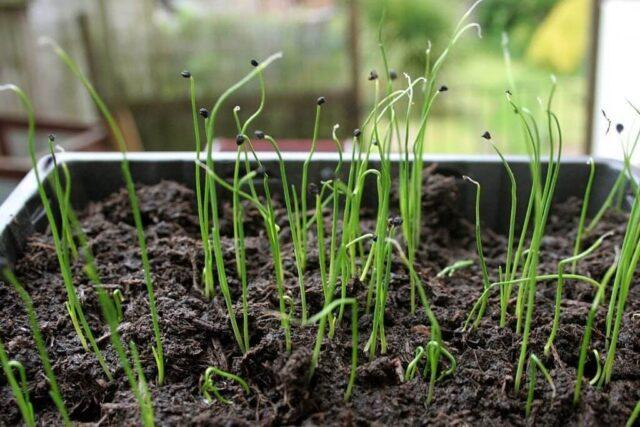
Seed shoots appear in 7-10 days
If seeds are planted directly in open ground, they require similar preparation. 5-7 cm are left between them, 10-15 cm between the rows. After the emergence of seedlings, the seedlings will have to be thinned out. Until the seeds germinate, it is recommended to tighten the bed with plastic wrap or black covering material.
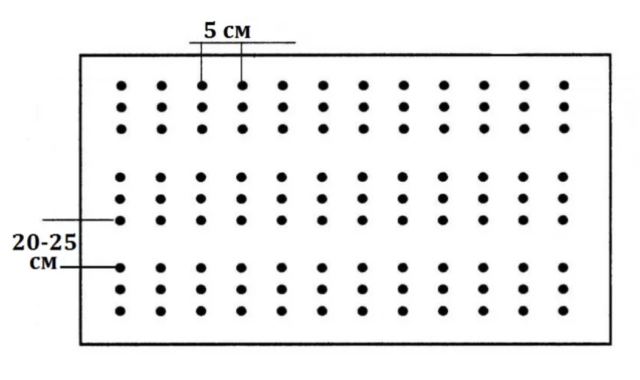
The recommended planting scheme for the Strigunovsky variety is 5-7x20-25 cm
Planting seedlings in open ground
Onion set Strigunovsky also needs pre-planting preparation. If it was not stored at room temperature, 3-4 days before disembarkation, the planting material is brought home for warming up. Then the seed is soaked in a solution of any biostimulant, washed with clean water, and dried.
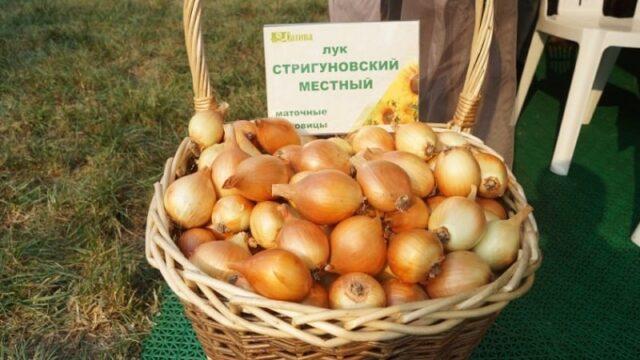
Before planting, you need to discard onion sets with mechanical damage, traces of rot, and other "suspicious symptoms"
Strigunovsky onions are planted in a bed with an interval of 10-12 cm with a row spacing of 20-25 cm. The most important thing is to leave the top on the soil surface. The soil is well watered before and after planting. When the water is absorbed, it is advisable to mulch the bed.
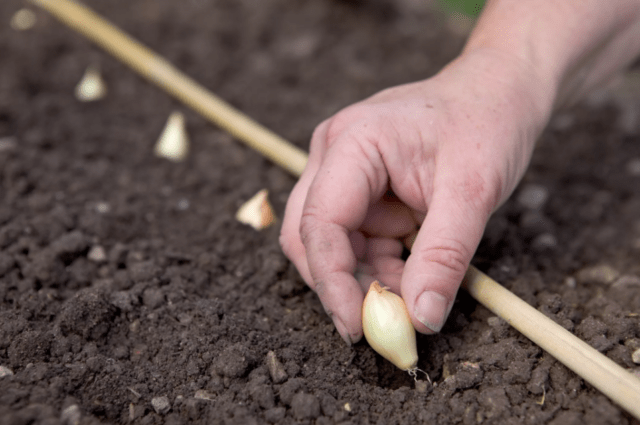
The bulbs are planted no earlier than the soil warms up to 10-12 ° C
This variety is also suitable for planting before winter. But then he does not need pre-planting processing. The bulbs are buried 4-5 cm, the bed is covered with a layer of peat or humus (2-3 cm).
Strigunovsky onion care
Care for the Strigunovsky onion is a standard agricultural technique for the culture:
- Irrigation. In the absence of natural precipitation from May to June, water is watered every 4-7 days, focusing on the air temperature. The approximate rate is 5-7 l / m². Then watering is stopped altogether, otherwise large bulbs will not work. An exception is made only if dry hot weather is established for a long time (2.5-3 weeks).
- Weeding and loosening. It is carried out every 1.5-2 weeks, the next day after watering. An alternative to regular weeding and loosening of the garden is mulching.
- Top dressing. Fertilizers are applied twice a season. The first time (about a week after the second thinning or after the emergence of seedlings from the seedlings), natural organic matter or a solution of mineral nitrogen-containing fertilizers is needed. After another 2.5-3 weeks, fertilizing with potassium and phosphorus is added.
Strigunovsky onion responds positively to both folk remedies and specialized complex store fertilizers.
If Strigunovsky is planted with seeds in open ground, it needs thinning. It is carried out in the phase of the second and fourth leaves, leaving 4-6 cm between adjacent specimens, then 8-10 cm.
Conclusion
Strigunovsky onion is a variety, the significant advantages and subjective disadvantages of which have long been well known. Several generations of gardeners have chosen it, given the consistently high yield, ease of care, very good immunity, keeping quality. It can be grown from both seeds and seedlings.
Reviews of gardeners about onion Strigunovsky

